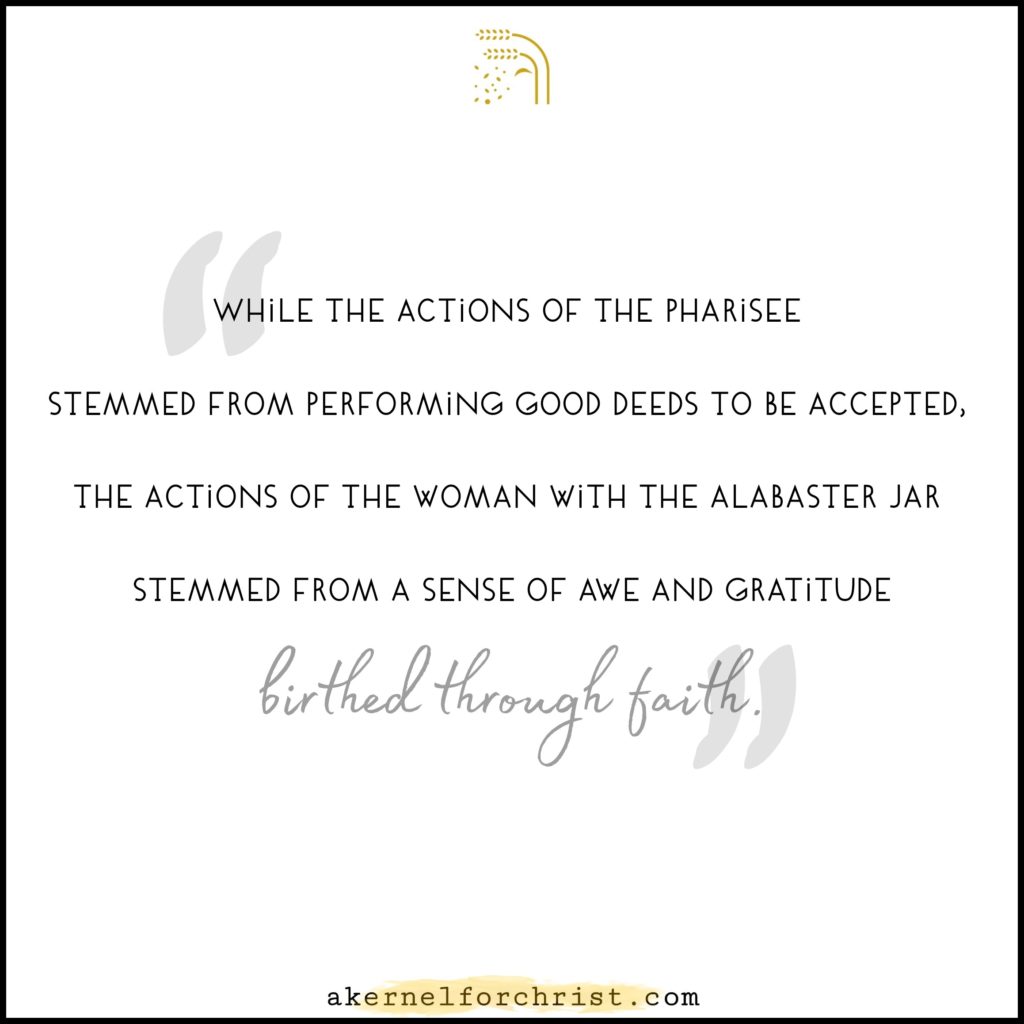The woman stood at the outer gate and hesitantly peered in.
Shifting from one foot to another, she began to rethink her decision for the hundredth time that evening. As the notes of music floated by her, she wondered if the prudent thing to do would be to wait for another time. Perhaps the Teacher would be in a better position to greet her another day. The word around town was that the Teacher was the guest of honour at Simon’s dinner party. And as everyone knew, the pharisee spared no expense when he threw his lavish celebrations.
She felt overwhelmed at the sight of so many sandals lying outside the door. She didn’t belong here and no one was as acutely aware of that fact as she was. Feeling like an intruder, her hands trembled she held the alabaster jar close. She dared not spill a single drop. It cost her more money than she could justify but she would not settle for anything less. Mustering every last ounce of courage, she pressed on. This was too important to delay. She could not afford to put it off any longer.
Her heart quickened as she thought back to the times she had heard the Teacher preach. He had promised “rest” to all who were “weak and heavy-laden”. She heard Him preach on the mount and had watched Him heal the sick. His words felt like a balm upon her battered soul and she wanted what He spoke of.
The room was filled with people. They all sat on cushions placed on the floor around a low table. The room was buzzing with activity as the guests enjoyed themselves and the servants walked in and out. She doubted if anyone even noticed her coming in.
The Teacher was not difficult to spot. She had seen him many times before. She was so close, she could hear him speak. He did not seem different from how she had seen him conduct himself among the multitudes. His words carried the weight of grace upon them and she was suddenly overcome with emotion as she was drawn to what He said.

Leaning on his elbow, with His feet away from the table before Him, the Teacher seemed oblivious to her presence. Unbothered by her seeming invisibility, the woman was overcome with emotion and began to weep. She thought of every deed she had done that made her unworthy to stand in the presence of this Man. She thought of the stark contrast between the life she led and the holiness that He preached of. To be in His very presence made her sensitive to her sinful condition. She continued to weep at the thought of His words – they promised eternal life and freedom from sin. To imagine that she would qualify for something so precious was beyond her scope of comprehension.
Shaking as huge sobs escaped from her, she bowed before him and let her tears fall on his feet. Her hair fell like a curtain around her and she used it to wipe the fallen tears. With eloquent actions that spoke louder than words, she kissed the Teachers feet and expressed her deepest repentance and gratitude upon them.
The silence in the room grew so thick, you could cut it with a knife. Only her sobs cut through the stillness that had settled upon the room. The woman was well aware of the impact her actions had upon the men that reclined around the table but was unable to stop herself. She poured the contents of the alabaster jar she had brought along with her and anointed the Teacher’s feet. She stayed there a while – a weeping, crouched, and broken woman – worshipping at the feet of Jesus.
This incident found in Luke 7:36-50 never fails to make an impact every time I come across it.
For Simon, the pharisee, neither the tears nor the plight of the woman moved him. What bothered him was that she would dare touch Jesus. He was indignant that Jesus would allow such a show of affection from a woman that had questionable morals. He was displeased that he chose to honour a Man who allowed, even praised, the actions of the woman. If we read the passage closely, we see in verse 39 that the pharisee did not really believe that Jesus was who He claimed to be. He did not even believe that Jesus qualified as a prophet. Jesus validating the woman’s actions only served to confirm Simon’s suspicions.
From what Jesus then says, we see that Simon did not invite Jesus to his home with the intention of honouring Him at all. He ignored all the courtesies that were bestowed upon guests in Jesus’s day. “When I entered your home, you didn’t offer me water to wash the dust from my feet, but she has washed them with her tears and wiped them with her hair. You didn’t greet me with a kiss, but from the time I first came in, she has not stopped kissing my feet. You neglected the courtesy of olive oil to anoint my head, but she has anointed my feet with rare perfume.“
We can only assume why Simon the pharisee was so cavalier in his attitude toward Jesus. Perhaps this was one of the occasions that the Pharisees created in order to trap Jesus into saying something that could get Him into trouble. Another possibility is that Simon simply did not consider Jesus to be important enough to go through all the rituals that were reserved for honouring guests.
Whatever the case may be, it is Jesus who brings clarity and order into the situation. He begins by reading Simon’s mind and answering his unasked question : Is this man truly a prophet?

“Then Jesus told him this story: “A man loaned money to two people—500 pieces of silver to one and 50 pieces to the other. But neither of them could repay him, so he kindly forgave them both, cancelling their debts. Who do you suppose loved him more after that?”
Simon answered, “I suppose the one for whom he cancelled the larger debt.”
“That’s right,” Jesus said.“
What a picture of grace and gratitude Jesus paints in this short parable! The performing Pharisee is sharply contrasted to the sinful woman who could not help but express her love and gratitude with such a public display. While he was more concerned about maintaining appearances, she could not care less about embarrassing herself.
While the actions of the Pharisee stemmed from performing good deeds to be accepted, the actions of the woman stemmed from a sense of awe and gratitude birthed through faith.
Jesus ends with the most stunning comment that sums up the attitude of every “pharisee” and “sinner” since the beginning of time to this very day: “I tell you, her sins—and they are many—have been forgiven, so she has shown me much love. But a person who is forgiven little shows only little love.”
Dear friend, what is our attitude towards the salvation that we have freely received? Do we think that we deserved it in any measure? Do we think our sins are not too vile or repugnant to warrant a heart that overflows with gratitude? Do we look at someone who is seemingly “worse” than we are and secretly think they really need to repent more than we do? Are we perhaps a bit too comfortable in our good works and hope that they will play a role in securing our salvation?
Remember, the woman with the alabaster jar was completely unacceptable to the pharisee but was praised by Jesus. It was her gratitude and humility, built upon faith, that brought forth her worship. It was not a mere performance for the benefit of the people around her. This was what caused Jesus to say “Your faith has saved you; go in peace.”
On the other hand, it was difficult for Jesus to get through to the self-righteous Pharisee who did not see his need for a Saviour. So, dear friend, perhaps you have been a believer for almost all your life but pause to reflect on what Christ accomplished on the cross for you. No number of days on Earth can diminish its significance and splendour. Let us take time to ponder upon what He truly saved us from. And when we do, we will certainly find gratitude pour out from our inner being that causes us to cry out:
“Oh, gift of gifts! Oh, grace of faith!
My God, how can it be
That thou, who hast discerning love,
Shouldst give that gift to me!
How many hearts thou mightst have had
More innocent than mine!
How many souls more worthy far
Of that pure touch of thine!
Ah, Grace! into unlikeliest hearts
It is thy boast to come;
The glory of thy light to find
In darkest spots a home.”


2 comments
To keep the FLAME 🔥 FUEL ⛽ with TIME
It was a wonderful thoughtful line …Keep up the good work dear Akkaa💕💕💕💕
Always a pleasure to hear from you, Jerusha.
Comments are closed.